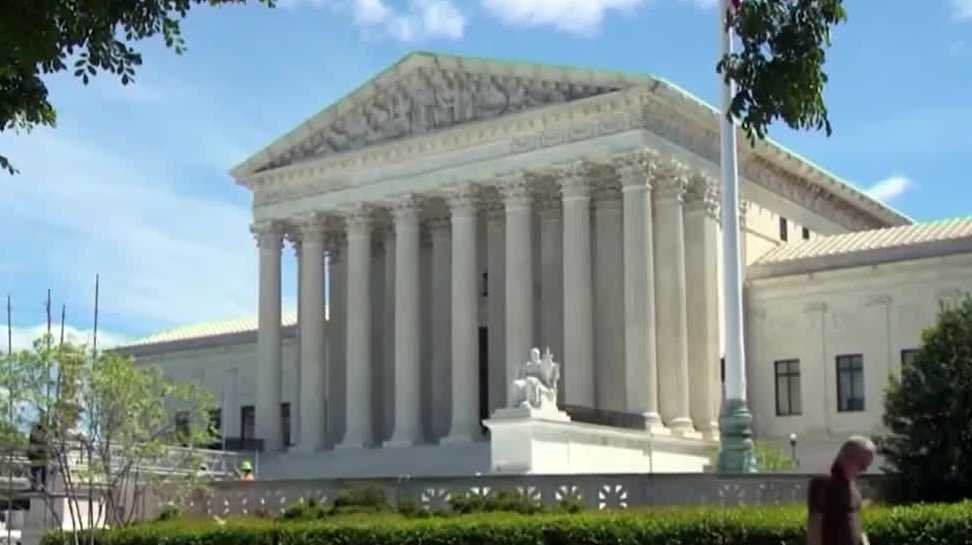Class action lawsuit filed over Trump’s birthright citizenship executive order
It didn’t take long for a new lawsuit to be filed following Friday’s Supreme Court ruling that limits a judge’s powers when it comes to nationwide injunctions. Several legal groups, including the ACLU of Maine, have filed a class-action lawsuit over President Donald Trump’s executive order regarding birthright citizenship.The new court ruling restricts courts’ ability to block federal policies using nationwide injunctions, which includes recent policies like Trump’s plans to ban birthright citizenship.”Thanks to this decision, we can now promptly file to proceed with numerous policies that have been wrongly enjoined on a nationwide basis,” Trump said. “Some of the cases we’re talking about would be ending birthright citizenship, which now comes to the fore.”However, the Trump Administration can’t proceed just yet. The executive order to end birthright citizenship won’t take effect until the end of July, which gives anyone time to take legal action in the meantime. That’s where the new lawsuit comes into play.The lawsuit wants a court to declare Trump’s birthright executive order unconstitutional and prevent defendants from enforcing it.”We are really hopeful that the court in our case, perhaps other courts, will recognize class-action status, and otherwise find ways to protect all of the individuals who would otherwise be affected by this,” ACLU of Maine Legal Director Carol Garvan said.Garvan said Trump’s executive order remains unconstitutional even after today’s ruling.”Birthright citizenship is just such a fundamental principle in our country,” Garvan said. “It’s just the basic principle that every baby who is born on U.S. soil is a U.S. citizen.”For Trump, Friday’s ruling is a win.”The Supreme Court has delivered a monumental victory for the Constitution, the separation of powers, and the rule of law,” Trump said.The state of Maine is not a party to the lawsuit. Still, Attorney General Aaron Frey is speaking out in response to the ruling.”Children born in Maine to immigrant parents are citizens. Nothing in today’s ruling changes that fact now or in the future. My colleagues and I remain committed to fighting for fidelity to the Constitution and its promise of birthright citizenship. While this case is not yet over, I am disappointed that the Supreme Court declined the opportunity to reaffirm a clear, 127-year-old legal precedent that the 14th Amendment to the United States Constitution protects birthright citizenship, instead choosing to limit the use of nationwide injunctions. At the same time, this order reminds us that relief from federal overreach may only be available to states, like Maine, when they bring a lawsuit to hold this presidential administration accountable,” Frey said in a statement.
It didn’t take long for a new lawsuit to be filed following Friday’s Supreme Court ruling that limits a judge’s powers when it comes to nationwide injunctions. Several legal groups, including the ACLU of Maine, have filed a class-action lawsuit over President Donald Trump’s executive order regarding birthright citizenship.
The new court ruling restricts courts’ ability to block federal policies using nationwide injunctions, which includes recent policies like Trump’s plans to ban birthright citizenship.
“Thanks to this decision, we can now promptly file to proceed with numerous policies that have been wrongly enjoined on a nationwide basis,” Trump said. “Some of the cases we’re talking about would be ending birthright citizenship, which now comes to the fore.”
However, the Trump Administration can’t proceed just yet. The executive order to end birthright citizenship won’t take effect until the end of July, which gives anyone time to take legal action in the meantime. That’s where the new lawsuit comes into play.
The lawsuit wants a court to declare Trump’s birthright executive order unconstitutional and prevent defendants from enforcing it.
“We are really hopeful that the court in our case, perhaps other courts, will recognize class-action status, and otherwise find ways to protect all of the individuals who would otherwise be affected by this,” ACLU of Maine Legal Director Carol Garvan said.
Garvan said Trump’s executive order remains unconstitutional even after today’s ruling.
“Birthright citizenship is just such a fundamental principle in our country,” Garvan said. “It’s just the basic principle that every baby who is born on U.S. soil is a U.S. citizen.”
For Trump, Friday’s ruling is a win.
“The Supreme Court has delivered a monumental victory for the Constitution, the separation of powers, and the rule of law,” Trump said.
The state of Maine is not a party to the lawsuit. Still, Attorney General Aaron Frey is speaking out in response to the ruling.
“Children born in Maine to immigrant parents are citizens. Nothing in today’s ruling changes that fact now or in the future. My colleagues and I remain committed to fighting for fidelity to the Constitution and its promise of birthright citizenship. While this case is not yet over, I am disappointed that the Supreme Court declined the opportunity to reaffirm a clear, 127-year-old legal precedent that the 14th Amendment to the United States Constitution protects birthright citizenship, instead choosing to limit the use of nationwide injunctions. At the same time, this order reminds us that relief from federal overreach may only be available to states, like Maine, when they bring a lawsuit to hold this presidential administration accountable,” Frey said in a statement.


